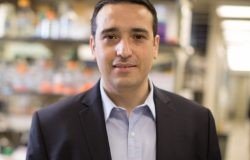Can you give us a brief description of yourself and your lab’s research interests?
I am an assistant professor at the Department of Genetics at the University of North Carolina Chapel Hill and a member at the UNC Lineberger Comprehensive Cancer Center since September 2018. In our lab, we aim to decipher the epigenetic mechanisms that govern T-cell lineage choice and commitment. We ask how aberrations in this process can result in malignant transformation and cancer emergence. Another interest is how aberrant T -cell differentiation can compromise immune response. So, our foundation is a very basic biological process: establishment of T-cell fate. By gaining understanding of this fundamental developmental process we expand on unlimited translational possibilities. I enjoy very much using diverse approaches to tackle these questions: immunology, mouse genetics, cell biology, genomics and I am open to new disciplines that we might find useful in our effort to answer our questions. It’s also fun to be part of a diverse scientific community and join forces with other scientists who share similar questions.
What do you find the most exciting and what is the most challenging thing about your research?
I think the most exciting is simultaneously the most challenging thing: figuring out the immense complexity that results in the marvel of life. Every time we answer a question, new exciting possibilities arise and the journey of scientific discovery is ongoing. As novel technologies emerge we can pursue questions with depth and precision that up to a couple of years ago we couldn’t even imagine.
How did you decide to pursue a career in science?
I didn’t really plan it. It was more a gradual process that resulted in a strong desire and need to be involved in research. I was aiming to go to Medical School but based on my performance in the national exams I was accepted in Biology. So, I joined more out of curiosity and I remember two major events convinced me that this was the path to follow. First, at an introductory biology course they mentioned Max Perutz’s quote: “Discovery is like falling in love, seeing something that no one else has ever seen before…” which I thought was fascinating and I wanted to experience this. Then, in one of my first laboratory courses we observed diatoms under the microscope and I was amazed by the beauty of nature that we actually ignore in our everyday life. That’s when I knew that I really wanted to study Biology. In the final year, I was assigned my own research project. Only when I completed the experimental procedures and I wrote my thesis did I realize that I wanted to join a research lab because simply I felt I belonged in that setting and I was happy. During my PhD thesis back home in Greece, at the BSRC Alexander Fleming, I was lucky to be surrounded by a supportive and generous mentor, Professor George Mosialos, and fantastic colleagues who created an inspiring environment. It was in this setting that I decided to come in USA and pursue a career in science.
A big part of navigating academic life involves mentoring. What is the best advice you got and what would you advise to young and early career researchers?
The best advice I got was to be strong and pursue my research questions and not to be discouraged if others don’t have faith in what I do. It’s my job to make a strong case and convince them.
My advice is to be bold, pursue your dreams and don’t let others define you. The sky is the limit. Don’t limit your scientific questions on what is “hot” or what is the “trend”. Original, groundbreaking, solid science cannot be ignored. Find which scientific questions are captivating for you and work hard to figure out the answers.
On a practical note, try to inform yourselves, search about opportunities, be open-minded, make time to network and meet people, do not hesitate to introduce yourselves and communicate your science. Also, in every career step don’t rush to make decisions. Take the time to carefully evaluate your options, seek advice and make a choice based on what it feels the best option for you. I cannot stress enough that science is a team work. So, make sure that you are choosing good and generous mentors not only based on their scientific merit but also in terms of being supportive for their trainees. Be a good colleague and select teammates who you can trust. As science becomes more and more multidisciplinary try to develop new skills. For instance, if you are passionate about genomics do not hesitate to develop bioinformatic skills. Last but not least, being a scientist is not merely about generating great science. We are interacting with people; students, trainees, colleagues. So, it is critical to develop strong communication skills and also management skills.
What are the key characteristics of a successful career in science?
In my opinion curiosity, creativity, authenticity, collegiality, and perseverance.
For more information on Dr. Tsagaratou’s research and group, please visit the link below: http://tsagaratou.web.unc.edu/
Interviewed by Charalampia Koutsioumpa



